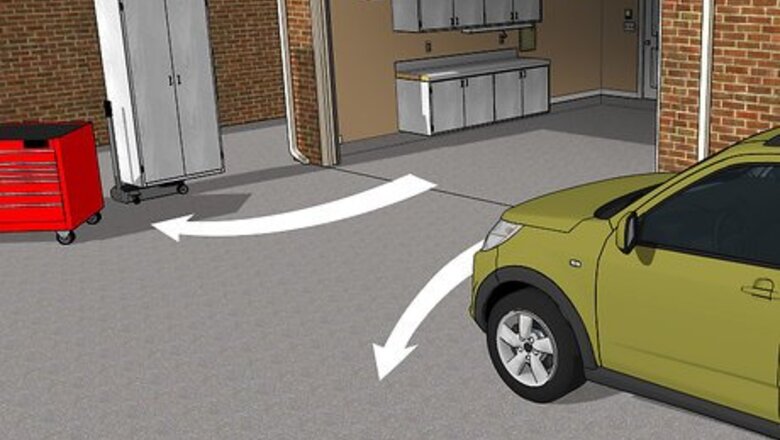
views
Picking up Your Garage
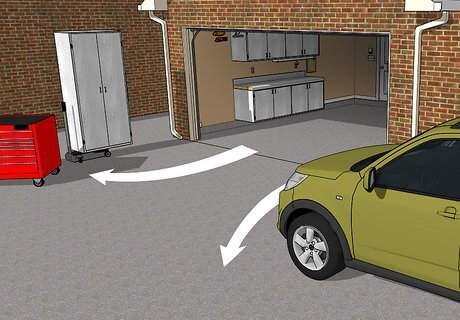
Clear the floor. You should remove anything from the garage floor that isn’t nailed down. Loose objects may get in the way while you clean, and they could get damaged during the process. Move all cars, bikes, tools, basins, boxes, and other items out of the garage until you are finished. You may leave items on shelves if you are confident that they will not be in the way of any water spray, hoses, or soap.

Cover drywall and outlets. Pin or tape a plastic drop cloth or tarp to the walls at least 3 feet (0.91 m) up from the floor. Make sure that any drywall or electrical outlets are covered by this cloth. This tarp will protect your walls from water damage and stains.

Sweep the floor. Before you apply any cleaning solution or water to your floor, you should sweep it with a broom. This will push dirt, dust, and large debris out of the way. Collect it in a dustpan, and throw away.
Removing Stains
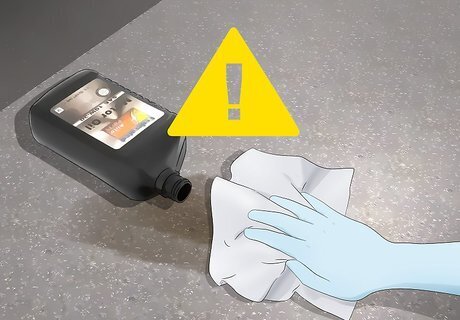
Mop up spills right away. If you spill oil or another solution on your garage floor, always clean it up right away. These liquids can set in the floor, making them more difficult to clean later. Use paper towels or reusable rags to mop up the mess, and throw them out or launder them when you are done.

Use lemon juice or vinegar on a rust stain. If you have rust stains on a concrete floor, try pouring lemon juice or vinegar on the stain. Use enough to cover the stain. Wait 5 minutes, then pour a second dose on top. Using a scrub brush with stiff bristles, scour the stain from the floor. If this does not work, you can try the same method but with a stronger, store-bought acid or rust remover. For very tough rust stains, you can mix ten parts water to one part muriatic acid. Apply to the stain, and leave it for five minutes before scrubbing out. Do not use acids or vinegar on epoxy floors.
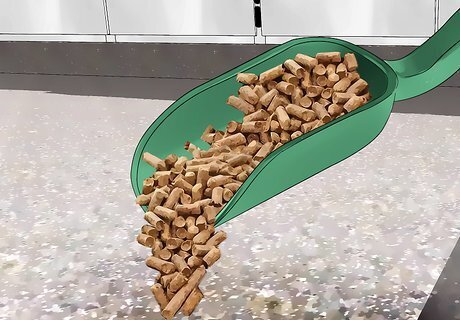
Sprinkle cat litter over oil stains. If you have a dried oil stain or if there is oil residue leftover after a spill, find some cat litter containing clay. Spread this over the stain. Leave the litter alone for a few hours or overnight to absorb the oil. Sweep it up when you are done. If the cat litter has not completely absorbed the oil after a day, replace it with fresh litter, and leave it for another day. For bad oil spills, this process can take a few days.

Apply a store-bought grease remover as an alternative. For oil and grease stains, you can purchase an oil and grease remover. Follow the instructions on the label. Generally, you will apply the solution to the stain, and let it dry. This usually takes several hours. When it is dry, you can sweep it up. These grease removers can typically be bought at a hardware store.

Scrub tough stains with detergent and water. Gather a box of powdered detergent, a bucket of warm water, and a stiff scrub brush. Sprinkle the detergent over the stain until it completely covers it. Dip the brush in the water, and scrub the stain vigorously until it is gone. When you are finished, wipe up as much detergent as you can with rags or paper towels, and let it dry.
Scrubbing Concrete Floors
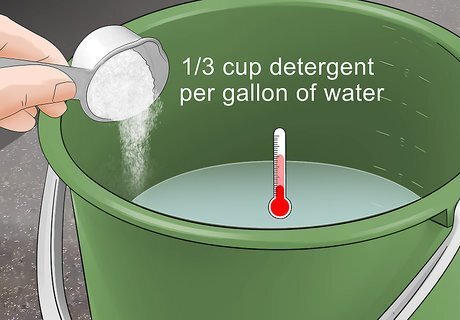
Mix a cleaning solution. No matter how you decide to clean your garage floor, you will need a warm and soapy cleaning solution. You can buy degreasing solutions from a hardware store, auto store, or sometimes even a grocery store. Follow the instructions on the label to mix the proper amount of cleaning solution with warm water in a bucket. You can also use powdered laundry detergent. Mix 1/3 cup (~58 g) of detergent with every 1 gallon (3.8 L) of warm water that you use.

Scrub the floor. For lightly soiled floors, you can clean them using a deck brush or a push broom with stiff bristles. Pour the cleaning solution on the floor. Let it sit for about 10-15 minutes so that it can absorb the dirt and oil. Once the time is up, use your brush to scrub the floor, moving across the entire floor. Once you have finished scrubbing, rinse the floor using a hose. Let the floor dry. Keep the garage door open as you clean. You can use a broom to push the water out of the door outside. This will help it dry. You may want to start far away from the door and move towards it as you clean. When you finish scrubbing, you will be next to the door. This will prevent you from having to walk across the slippery and clean floor.
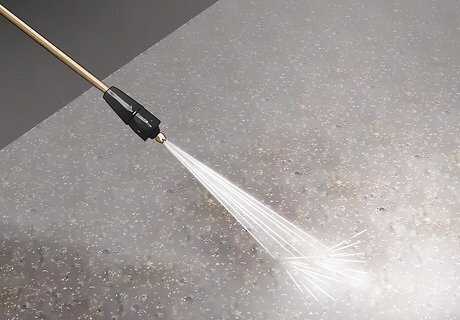
Use a power washer for really soiled areas. If your garage floor is really dirty or if it has not been cleaned in a long time, you should try a power washer. You can rent these from a hardware store. Cover the floor with the cleaning solution, and wait 15 minutes. Turn on the power washer, and spray down the floor, moving the nozzle in broad strokes across your floor as you do so. Keep moving the spray across the floor; do not let it linger too long on one spot or else it can scratch your floor. Keep your garage doors open when using a power washer so that the water can drain out.

Run a buffer over the floor for best results. You can rent a floor buffer from a hardware store. This will scrub the floor of your garage in a more powerful way than you can do by hand. Apply the soapy cleaning solution to the floor. Turn on the buffer, and guide it over the floor. Rinse with a high-pressure hose. Let the floor dry afterwards. It might be easier if you break up the floor into sections. Do one section of floor at a time. Rent a buffer with a nylon scrub head. These are best suited for concrete floors.
Mopping Epoxy Floors

Sweep with a dust mop weekly. Epoxy floors usually do not require much heavy-duty cleaning. You can keep the floor clean by using a dust mop once a week. Run the dust mop over the entire floor. Wash the mop head in the washing machine between uses. If you do not have a dust mop, you can also use a broom with soft bristles. Sweep up debris into a dustpan, and throw away.

Wash the floor. Every 3 to 4 months, wash the floor with a foam mop. Mix a ⁄2 cup (120 mL) of ammonia with 1 gallon (3.8 L) of hot water. Dip the mop in the solution, and move it across the floor. Once you are done, you can let it air dry or you can wipe it up with an old towel. Do not use soap-based cleaners, such as laundry detergent, as these may leave residue behind on your floor. Stringy mops may leave streaks behind on your floor.
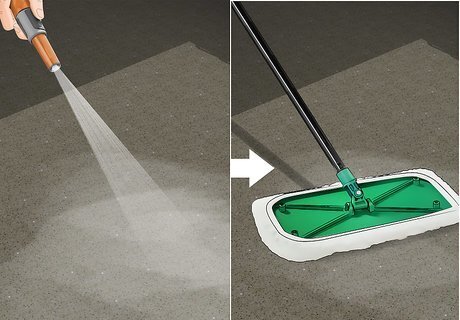
Remove residue and stains with hot water. If there is any residue left on the epoxy floor from road treatments or salt, you can pour hot water on them to remove them. Wipe it up afterwards with a towel or rag. You can also just hose down the floor and mop it up afterwards.

Scrub stains with a cleaning solution. Pour hot water on stains, and gently scrub them with a scrub pad or sponge. If you need to, you can use a gentle cleaning solution like Soft Scrub. Apply to the stain, and scrub the spot, rinsing afterwards. Do not use abrasive or strong cleaning solutions like Comet on epoxy floors.











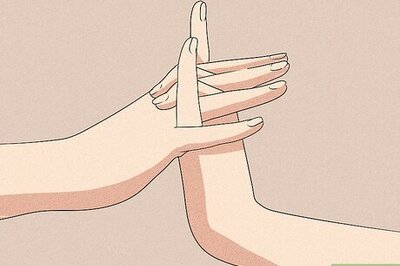





Comments
0 comment